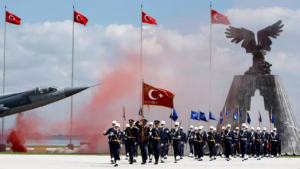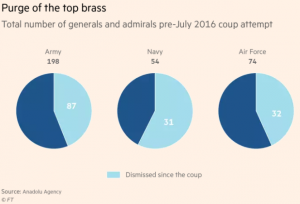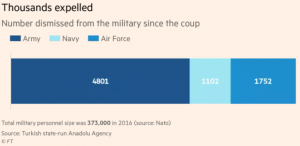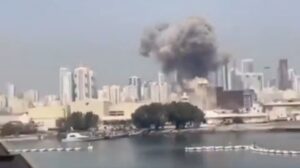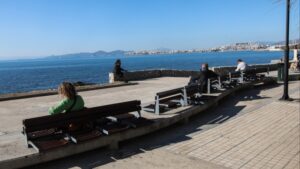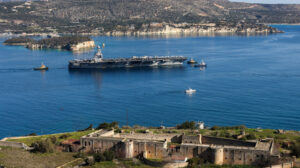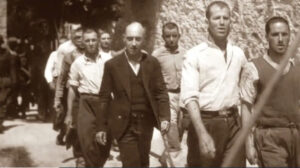As a busy summer flying passengers around the world drew to a close, most Turkish Airlines pilots were looking forward to a relaxed autumn. Instead, the government dropped a bombshell.
An emergency decree published late last month announced that scores of former fighter jet pilots face a mandatory recall — or risk losing their licences. Between 200 and 300 civilian pilots, many of whom work for the national flag carrier, could now be summoned back to fill a shortage in the air force created by President Recep Tayyip Erdogan’s purge of the military after last year’s failed putsch, analysts and pilots say.
The news sent shockwaves through the aviation sector.
“Everyone is asking: have they summoned us yet?” said a Turkish Airlines captain who counts several former military pilots among his closest colleagues. “It’s a very difficult situation for these guys. They’ve bought houses in Istanbul, found schools for their children. And now they are being asked to leave.”
The recall is the most drastic step so far in Turkey’s scramble to plug a gaping hole at the heart of its air force. It was at the forefront of the putsch attempt in July 2016 during which rogue F-16 fighter pilots strafed the streets of Ankara and launched air strikes on the parliament. After the insurrection was quashed, hundreds of F-16 and F-4 pilots were arrested or expelled.
The second-largest military in Nato is now struggling to make up the deficit.
“The fact that there is a mandatory recall speaks for itself,” said Metin Gurcan, a former soldier who is now a defence analyst for the website Al-Monitor. “The pilot shortages within the Turkish air force have reached a critical level.”
The shortage is alarming not only Ankara but also its Nato allies, who perform joint operations and training drills with their Turkish counterparts.
“There were real concerns about the quality of their personnel prior to the coup,” said an officer in a fellow Nato air force. “It has not improved since then. There are legitimate concerns about the potential for misunderstandings or mistakes.”
The Turkish armed forces did not respond to a request for comment.
Western military officials estimate that Turkey has dismissed or arrested about 600 combat pilots since the coup attempt — about half of the total. The pilot-to-cockpit ratio, aimed at ensuring pilots get sufficient rest, has plunged. Pilots are flying longer hours to maintain the level of combat operations against Kurdish militants, as well as patrols over the Aegean Sea and along the borders with Syria and Iraq, the officials say.
The loss has been exacerbated by the sacking of flight instructors, squadron commanders and other senior officers, as well as the abolition of the old military high schools, since the coup attempt.
Even before the putsch, the air force suffered from a shortfall. A 2012 reduction in the number of years of compulsory service for pilots from 15 to 13, saw hundreds leave to join Turkey’s booming commercial aviation sector. Many former air force officers are convinced that the exodus was exploited by the Gulenist movement, the Islamist network Ankara accuses of orchestrating the rebellion, as a way of pushing their supporters up the ranks.
Following the coup attempt, the Turkish air force sought to fill the empty cockpits by launching a call for voluntary returns.
It also increased the minimum number of years of service for professional military personnel to 18, and turned to allies for help. Turkey asked the US to send F-16 instructors to accelerate the training of younger pilots. But the US air force, which is changing to use F-35 fighters, told Ankara that it had none to spare, says a person familiar with the issue.
Finally, at the end of August, Turkey took the unprecedented step of demanding that the former officers go back. The recall requires all pilots who left the service after 2012 and have not fulfilled the new 18-year minimum requirement to return for tests.
Many former officers are torn.
“Who doesn’t love flying at the speed of sound and doing whatever you want with a fighter jet?” said a former F-16 pilot now working for a commercial airline. “Civilian aviation is not so fun. You are just a driver.”
He was tempted to take up the call for voluntary return but going back would cause him to miss out on his impending promotion to captain.
Another former pilot said he would love to rejoin but his wife does not want to move from Istanbul to an isolated air base. “I would give my life for the Turkish military without even thinking about it,” he said. “I really want to help. But my family doesn’t want me to.”
In a bid to cushion the blow, the air force has promised returning pilots special pay and bonuses to make up for leaving a civilian job that, for captains, pays about $8,000 per month — more than double the salary of a combat pilot. The airlines will also be obliged to re-hire them when they have completed their mandatory service.
Pilots who refuse to return will have their civil licence suspended for several years, the decree says. An alternative is for them to leave Turkey to work for foreign airlines. But a 15-day deadline to sign up once a summons is received leaves little time to find alternative employment.
There are doubts, however, as to whether the recall will do enough to make up for the post-coup deficit in numbers.
“It’s unclear if this measure will make a dent in the problem,” said Aaron Stein, senior fellow at the Washington-based Atlantic Council. “It will take years to replace the lost experience.”
Source: ft.com
Ask me anything
Explore related questions
